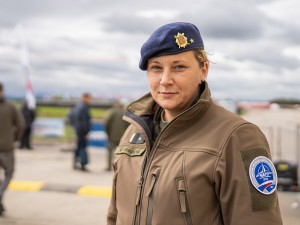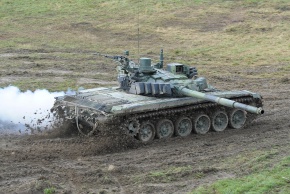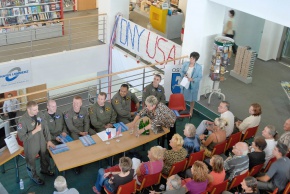News
I'm proud every time my prediction comes out 100 % // Humans of NATO Days
It is impossible to organize the NATO Days in Ostrava & Czech Air Force Days without a lot of people. Some have been preparing it for weeks and months, some are involved in the final preparations, and others can be seen by visitors in static or dynamic displays. In the #HumansofNATODays series, we want to present representatives of various components and participants of the event, the weather forecast of which is an integral part.
Major Veronika Kolíbalová Krausová serves as a meteorologist at the Land Forces Command. At last year's NATO Days in Ostrava & Czech Air Force Days, we met her every morning and evening, when she told us what kind of weather we can expect in the next few hours, which is essential for planning the program, especially flight displays. And so we interviewed her a bit. Why exactly meteorology or how is she different from the weather girls on TV?
What path leads to the position of military meteorologist?
In my case, through the University of Defence in Brno, majoring in meteorology at the Faculty of Military Technology. I got to my current position after fifteen years in the Army of the Czech Republic, when I went through various functions. I started as a meteorologist-synoptic at the Náměšť Air Base. After that, I got to the Department of Hydrometeorology of the Military Geographical and Hydrometeorological Office in Prague via the Joint Forces Command and the Department of Intelligence Security in Olomouc. I initially worked there as the deputy head of the hydrometeorology department and then served as a member of the permanent hydrometeorological security shift.
|
|
What made you want to become a meteorologist?
My grandfather was a soldier, he served at the air base in Kbely and at the air base in Náměšť. My grandmother, who was an air defense operator, was also a soldier, so I was fascinated by aviation and their stories from the service. That's why I wanted to go to air traffic control. But when I took the entrance exams at the University of Defence in Brno, this field was not open. The closest thing to aviation was meteorology, and I definitely don't regret that choice.
What do you enjoy most about being a meteorologist?
I enjoy the variety, in aviation meteorology I enjoy working with people, communicating with pilots. I enjoy how the weather develops. Meteorology is an incredibly interesting field. The study of the atmosphere offers many possibilities, the whole system of how the atmosphere works has fascinated me for years. Unfortunately, I don't have enough time to devote myself to this work on a deeper scientific level.
In the position I hold now, I am more of a manager of expertise. In my role, I not only work with people, but I take care of the hydrometeorological security system as a whole, the use and state of technology, its service, compliance with regulations, implementation of individual regulations, new regulations based on documents of the World Meteorological Organization or ICAO (International Civil Aviation Organization).
What is the job description of a meteorologist? Do you have any special equipment?
Meteorologists measure, record and predict (determine the probability) of the occurrence of meteorological phenomena in the atmosphere. There is a certain adrenaline in it, because we are constantly balancing on the edge of probability and reality - we know very well how it was, and it is always a question of how it will be. The atmosphere and weather are constantly evolving and changing.
Now, numerical models are the basis of weather forecasting, and for them the basis is the measurement of the current conditions of the atmosphere (temperature, pressure, humidity, direction, wind speed). The special equipment of the ground forces includes the mobile hydrometeorological stations Oblak and Blesk of the 53rd Reconnaissance and Electronic Warfare Regiment. At the 13th Artillery Regiment, we have a mobile device for radiosonde measurement, the so-called "Podteo", which you could also see at the NATO Days as part of a static display. In addition, the 31st Regiment of Radiological, Chemical and Biological Protection has special kits for measuring the atmosphere called Vaisala.
What is the difference between the work of a civil and a military meteorologist?
The difference between military and civilian meteorology is significant. Civil meteorologists are mostly employed by graduates of the Faculty of Mathematics and Physics, and their work is more exact, they work more with numerical models, mathematics, physics, and are more scientifically oriented.
As soldiers, we are more flexible, we usually do not focus on just one field of meteorology (synoptic meteorology, climatology, numerical modeling, aerology), we are "multifunctional" in a way. We are able to go out into field conditions and make forecasts for the commanders and staffs of individual types of troops, as well as provide air force and artillery. We have to deal with the equipment, with the connection and above all we have to adapt as quickly as possible to changing conditions. For example, when I serve a shift at the airport in Náměšť, I simultaneously prepare a weekly forecast for the commander of the land forces focused on the influence of hydrometeorological conditions on the activities of the troops, and the following week I forecast the weather for an exercise at Libavá.
I think that our scope is much wider than that of civilian meteorologists within the Czech Hydrometeorological Institute. They have the advantage that they can focus on one field of meteorology and devote themselves to it more deeply.
How far into the future can you predict the weather?
We try to be 3-4 days ahead, the success rate of these mid-term forecasts is around 90 to 95%. Then we make forecasts for up to 7 days, but the success of the forecast decreases with each passing day. The weather is constantly evolving, so the success rate of multi-day forecasts will never be what we would like it to be, i.e. 100 %. The possibilities of making predictions are not like that.
What is the interest in working as a military meteorologist? What does a person have to fulfill in order to get to this position?
There are several levels of military meteorologists. We have military aviation meteorologists-observers, meteorologists-synoptics who forecast the weather, and then meteorologists-aerologists who are mostly with land units. For each such position, a person must meet different conditions. A high school education is sufficient for meteorologists-aerologists and observers. However, we then send those interested to meteorology courses as part of our military education, and within about a year they are able to perform this work.
If you want to forecast the weather, you must have a university degree, for which we have a special field at the Department of Military Geography and Meteorology at the University of Defense in Brno, from where new meteorologists-synoptics come to us.
Unfortunately, the interest in recent years has not been what we would have imagined. Women are making significant progress in this field, almost 50 % of people in the field are women. But sometimes it can cause problems when we go to foreign operations or for field training, because there are certain restrictions for women when working with technology.
In recent years, accepting students or graduates of the fields of geography and geoinformatics from civilian schools, who have the basics of meteorology and climatology, was effective. We then send them to professional courses. In recent years, we have had very good experiences with these civilian students.
Do you also have experience with foreign missions?
In 2010, I served as a meteorologist with a helicopter unit in Afghanistan. The weather in Afghanistan is completely different than in the Czech Republic. I must say that it was much easier to predict there, there is not so much vegetation and water bodies. The weather there was generally more readable and the forecasts worked out very well for us. Of course, it was also interesting because of the position or situation we were in there. It was a very valuable experience for me as a soldier.
Is there a moment in your career that you are most proud of?
I'm proud every time my prediction comes out 100 %. And also for the fact that I am in the position I am in and that I still enjoy my work and find it fulfilling.






















.jpg)
.jpg)